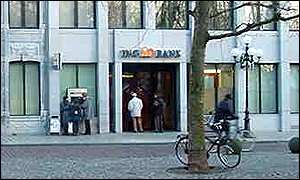| You are in: Business | ||||||||||||||||||||||||||||||||||||||||||||||||||||||||||||||||||||||||||||||||||||||||||||||||||||||||||||||||||||||||||||||||||||||||||||||||||||||||||||||||||||||||
|
Friday, 14 December, 2001, 11:03 GMT
A short queue for free cash

ING was hardly besieged by punters seeking euro coins
The arrival of the euro is imminent, with the first coins handed out at the end of this week. BBC News Online's James Arnold is on a tour of the eurozone to take the region's temperature ahead of this momentous changeover. His sixth report comes from Maastricht, the Dutch town which to many marks the beginning of the whole single currency project.
Maybe it was the intense cold that kept the crowds away. The Dutch city of Maastricht, in a sense the spiritual home of the single currency, reacted with surprising calmness as the first euro coins were handed out. When the ING bank on Vrijthof in the heart of the city opened for business at 9am, only six people were waiting outside - and three of them were journalists. "People in Maastricht are always relaxed," said Marie-Jeanne Anke, one of the three genuine members of the public. "It takes a lot to get them excited." The euro goes public But this is nonetheless a big day for Maastricht - inextricably linked with the euro as the location of the 1991 summit that launched the single currency project. For the first time today, euro coins are being made available to the public in three countries, with the other nine nations launching them on Saturday or Monday.
Euro notes, however, are not going to be available to the public until the end of the year. In Germany, the eurozone's largest economy, the public will have to wait till Monday to get its hands on the euro starter packs. In the Netherlands, unlike the rest of the 12-country eurozone, citizens will also be given roughly 3.9 euros free of charge by the government. Muted enthusiasm Understandably, those who have braved the cold on the Vrijthof were always going to be euro-enthusiasts.
"When I first saw the euro, I thought it looked like monopoly money," said Caroline Schuurmann, who owns the nearby McDonald's restaurant. "But whatever the design, it will bring us huge benefits here in Maastricht - we get so many visitors here from Belgium, France and Germany and it will make international travel much easier." Maastricht is in the southernmost tip of the Netherlands, wedged between Belgium and Germany. The real thing? The coins themselves do have a somewhat artificial air. As befits their status as the world's newest currency, they shine to a degree that normal, everyday money never approaches. The relatively unremarkable patterns - on the obverse, at least - bear the unmistakable hallmarks of being designed by committee, carrying a map of the EU together with the face value.
Which still leaves large gaps for where non-member neighbours such as Switzerland and Norway would normally be found. The reverse, on the other hand, is up to the individual country: in the Netherlands, it shows a stylised portrait of Queen Beatrix. The notes, meanwhile, are uniform across the eurozone, with no visible distinction to show their provenance. "I'm not sure what I think of these shiny little things," said Ellen Geels, a latecomer to the euro handout. "Our guilders were so pretty; it seems a shame." |
Top Business stories now:
Links to more Business stories are at the foot of the page.
|
||||||||||||||||||||||||||||||||||||||||||||||||||||||||||||||||||||||||||||||||||||||||||||||||||||||||||||||||||||||||||||||||||||||||||||||||||||||||||||||||||||||
|
Links to more Business stories |
 |
||
| ----------------------------------------------------------------------------------
To BBC Sport>> | To BBC Weather>> | To BBC World Service>> ---------------------------------------------------------------------------------- © MMIII | News Sources | Privacy |